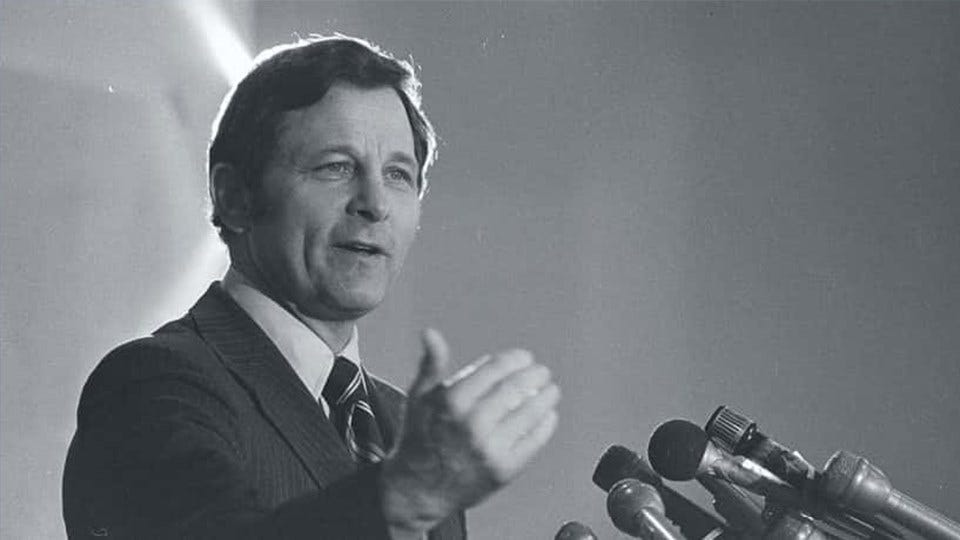Bayh-Dole Act Marks 40 Years of Innovation
 (photo courtesy of our partners at WIBC)
(photo courtesy of our partners at WIBC)
Subscriber Benefit
As a subscriber you can listen to articles at work, in the car, or while you work out. Subscribe NowINDIANAPOLIS - A landmark piece of legislation authored by former U.S. Senator Birch Bayh recently marked its 40th anniversary. The Bayh-Dole Act, enacted in 1980, allows universities and companies to retain the rights to inventions made with government funding in order to commercialize them. Chris Bayh, son of the late Indiana senator, is an attorney with Barnes & Thornburg in Indianapolis and says his dad put the Bayh-Dole Act on the same level as the two constitutional amendments he drafted in terms of his biggest accomplishments.
Joe Allen, who worked on Bayh’s staff when the bill was being drafted, tells Inside INdiana Business the Bayh-Dole Act reversed 40 years of law that said if the government had funded an invention through a university or federal laboratory, it was essentially put in the public domain and no one had the rights to develop it.
“And the problem is, when government funds research, it’s not making a product. It’s making more of an idea,” said Allen. “We found that there were 28,000 inventions that had been made and very few of them had been commercialized. So we thought with the government funding hundreds of millions of dollars of research every year, it just didn’t make any sense to have these inventions just basically given away where the Japanese and the foreign competitors could copy them but no one in the United States actually turning them into products.”
Allen says without the Bayh-Dole Act, the collaboration among industry, academia and government to develop a vaccine for COVID-19 would not have happened.
“Companies would’ve been deathly afraid that if they had worked university or with the (National Institutes of Health), if there was an invention made, it would be taken away from them and made freely available for the Chinese, the Russians, anybody to copy,” said Allen. “And if you look at what just happened with Operation Warp Speed, most of the funding came from industry and industry is taking a risk. If those drugs don’t work, no one’s paying them back for that. So you would never have had the kind of development we just saw where you had a vaccine developed in six to nine months, which is unheard of, before Bayh-Dole.”
When the bill was being drafted in 1979, Allen says there were many who believed that if the government funds anything, it should be put in the public domain so everyone can use it. Additionally, because the bill was limited to universities and small companies instead of large corporations, Allen says it was criticized by others, including the Carter administration.
“We had a lot of support, but the problem was Bayh-Dole was passed in the very last days of the Congress,” Allen said. “You had a presidential election. The president lost. Senator Bayh had lost by the time Bayh-Dole had come up, so we actually had to pass it by unanimous consent, which means that one negative vote could kill it. It’s a real tribute to Birch Bayh and also Bob Dole that they were so well respected on their respective sides of the aisle, that we were able to…get this across the finish line at the very last minute.”
Birch Bayh passed away in 2019 and many remembered him for authoring the federal Title IX law and drafting the 25th and 26th amendments to the U.S. Constitution. However, Chris Bayh says his father noted the Bayh-Dole Act as one of his crowning achievements.
“It’s one of the things he was absolutely most proud of and one of those things where government actually is working and legislation is working just exactly in the way it was intended to,” said Bayh. “His takeaway from this is that it took the hard work of so many different people, so many different stakeholders, interest groups, colleges and universities, and staffers like Joe to get this done and without all of those efforts, everyone working together, the whole thing could have fallen short.”
Allen says the Bayh-Dole Act reversed 40 years of law.
Allen says without the Bayh-Dole Act, the collaboration among industry, academia and government to develop a vaccine for COVID-19 would not have happened.
